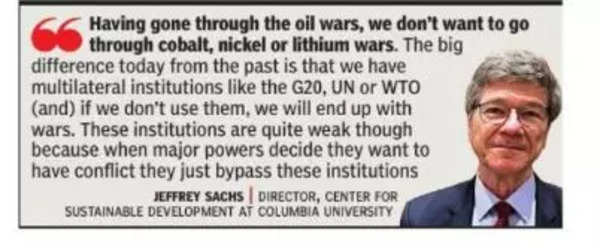‘Rich countries need to fund multilateral banks’

[ad_1]
How do you see the current banking crisis affecting the need for financing for climate action?
So far, the banking crisis is not completely out of hand. I hope that it will be contained. We are certainly not yet in a condition like the 1997 Asian Financial Crisis or like 2008. We have several banks in trouble, some tightening of credit conditions not only because of the banking crisis, but mainly because the US Fed and the European Central Bank have tightened (rates) to fight inflation. The problem of climate finance is not these immediate conditions, but the challenge of low-cost long-term financing for infrastructure for developing countries. The world system has not deliveredand we have a higher access to finance with the rich countries having the most access and the poorest having almost no access, while it needs to be exactly the reverse. Some measures in the short term are to increase the amount of funding going through the multilateral development finance institutions. The problem with them is their scale is too small. The total lending from those institutions is no more than $150 billion a year, probably closer to $100 billion. But the needs are at least $1 trillion a year, or even higher. My recommendation is a large-scale increase of funding from the multilateral development banks. The approach to that would be that rich countries would put in new capital into these banks and then they would leverage that capital roughly five times. The US has called for an energy transition so it needs to put some money in and this is the most basic point for G20, which is to make practical decisions in September in India.
Then there is a deeper agenda which is making the international financial system work not just for the rich countries but for everybody in a more fundamental way. I think that will come through a number of changes in the international financial structure including a diminished role of the US dollar and an increased role internationally for currencies like the rupee, the renminbi, the rouble and other because we are moving to a multi-currency world and more countries will be able to finance their development in national currencies and at more favourable terms.

Will recapitalisation by developed countries come in the way of restructuring of these agencies, where the emerging market economies want a greater role to reflect their muscle in the global economy?
The issue of recapitalisation is very political in the US Congress, for example, because of the anti-China sentiments. The idea of voting more money for the World Bank, in which China gets a larger share of the vote, would be highly difficult in the US political context. India, China and other emerging economies need a larger vote and a larger say but for the moment I would try to find new windows in these institutions that don’t necessarily change the voting power but practically provide a lot more finance so that maybe we could actually get something done and get the financing flow working for the longer term geopolitical change.
How serious is the threat of contagion to the banking system? Are emerging economies prepared for that?
I don’t think we can be sure how serious this is right now because a lot is not known about the balance sheets of a lot of major banks and there is always the risk of self-fulfilling panics. But this is something that the G20 absolutely needs to take on. This is another reason why the US, China and Europe agree at the G20 that we are going to put our focus on these issues not on geopolitical divisions to make sure that we don’t let that accident happen right now.
#Rich #countries #fund #multilateral #banks




